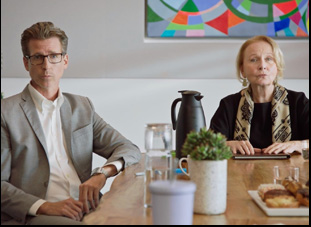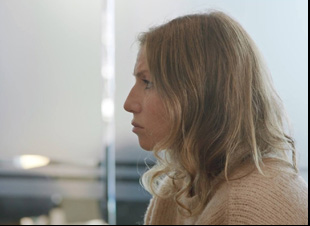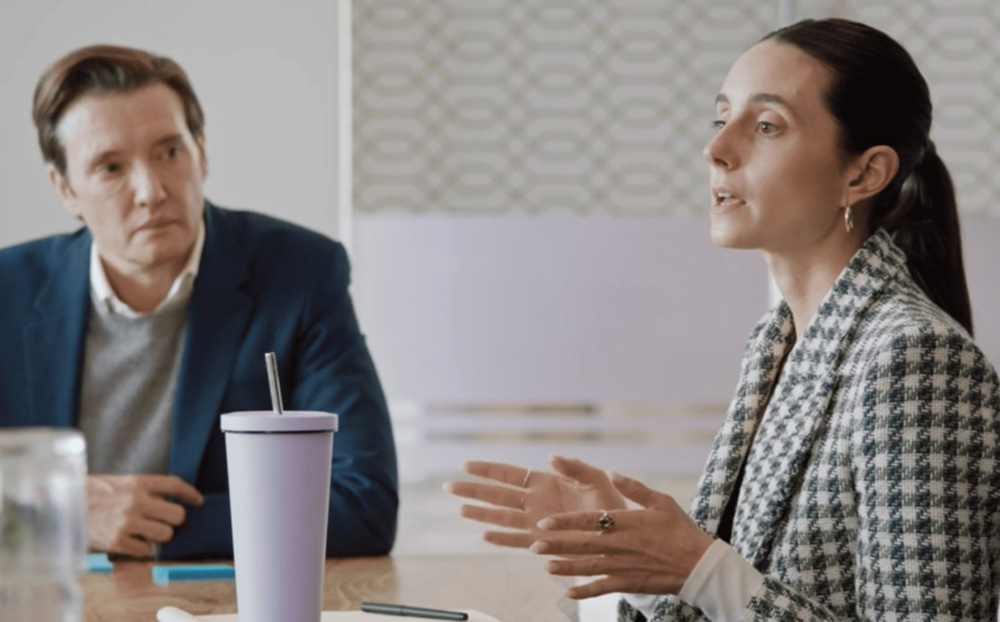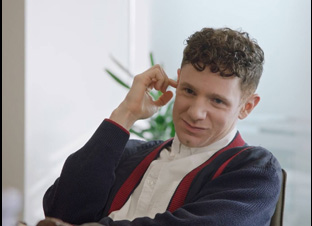“This generation has access to tragedy in their pockets,” one of the executives (Kate Burton) from the Anne Frank House in Amsterdam laments in “The Anne Frank Gift Shop,” making the trip to America to talk to some PR specialists what could drive more youthful interest in the landmark where the Jewish teenager and her family hid from the Nazis as they overtook Europe. A Conde Nast Traveler review argued that the most infamous element of the place now were the lines outside, but attendance isn’t a concern for the reps so much as the fact that memory of Frank and organized hatred that ultimately led to the end of her life among six million others has seemed to fade with time, not to mention the daily deluge of news about atrocities around the world that can make one feel numb to just about anything.
Enter a social media influencer (Mary Beth Barone) that the PR firm brings with the hopes to convince her of spreading a message to her 700,000 followers as much as making the Anne Frank House a new client, and while she may seem like an odd fit for such serious subject matter when she typically makes bank doing product activations for Heineken, her perspective on refreshing a narrative for new audiences proves as illuminating as what writer/director Mickey Rapkin is doing behind the scenes of his narrative directorial debut. After his book about college A Capella groups was the basis for the “Pitch Perfect” franchise, the filmmaker may be as nearly as unexpected a choice to be taking on such weighty material with a large starry ensemble – “Abbott Elementary”’s Chris Perfetti, Jason Butler Harner and Ari Graynor serve as the flacks on one side of the conference room table while Burton and Josh Meyers sit across from them as the potential clients from the Netherlands – for his first solo project, he proves to be the right one, leavening the grim, necessary work of carrying on stories about the worst parts of our history in order not to repeat them.
In a fleet and funny 14-minute short, Rapkin imagines ideas being bandied about for a rebrand, in which the Anne Frank House execs hope the PR firm can do for them what they did for a Human Rights Museum in Atlanta, generating conversation around difficult subjects and in a brainstorming session where inevitably many of the pitches are cringe-inducing, the discussion itself across people of a variety of different ages and backgrounds shows how sharing memories of a painful past are bound to leave an impression and keep it alive for generations to come. Sparking conversations on the festival circuit and beyond ever since it premiered last summer, “The Anne Frank Gift Shop” can be watched now online over at GQ where Rapkin is an editor and has earned a place on the Oscar shortlist for Best Live-Action Short and awaiting a potential nomination next week, Rapkin spoke about how he so deftly handled touchy subject matter and the demands of giving the right amount of space to each member of the talented acting ensemble he assembled as well as how the film itself is a product of wanting to carry the story of the Holocaust into the future.
I really wanted to direct something. Hollywood is hard. Sometimes you sell something — a script, an idea — and you’re so excited, and then it goes through development for years and then it falls apart. I’d gotten so close on a couple of projects getting made, not that I was going to direct, but things I made that fell apart and every time you get your hopes up and it’s heartbreaking. So I just felt, “I want to make something, and I had this crazy idea and I [thought] I’m going to raise the money, I’m going to cast the actors, and I’ll find the DP. And I had a great producer in Reboot Studios and then Jane Sinisi [at Phiphen] came on, and I wasn’t going to wait for a gatekeeper to tell me, “yes, you can make your story.” I just decided to make it myself.
It’s interesting because it’s largely a single confined setting, which makes you think it’d be easy, but you really show off some directorial chops in having this large ensemble that you’ve got a to balance out. Were you initially daunted by what you had written?
When you are writing a short film, and it’s your first thing and you know it’s going be hard to raise the money, you’re thinking, what story am I obsessed with, but also, I need it in a confined space to save money. Twenty years ago, I’d been to the Anne Frank House and had the experience everybody has and every emotion that you think you’re going to have. I walked through the halls and I cried. And then you exit through the gift shop and I laughed because I [thought], “Oh my God, what are you going to buy? Who would buy a postcard?” That’s my sense of humor. So I imagined a meeting between the Anne Frank House and this New York design firm they’ve hired to help them renovate the gift shop to appeal to young people, and this happened to be set in a conference room. I got advice from a ton of people, and everyone said, “A dinner party scene, an office meeting, anything around the table is boring for your actors [because] they do [the same scene] again and again and you’re just shoot over everybody’s shoulder many times, all around the table.” But I was so lucky because most of my actors are theater people originally, with the exception of Mary Beth Barone, who’s a stand-up comedian, so doing the repetition, they were ready to go and didn’t mind. They had fun playing with each other.

I knew we needed two representatives from the Anne Frank House, and then someone running the meeting, and we needed an influencer, and this is not an original idea, but when two people are having an argument about something [in a film], both people need to be right. Otherwise, the argument doesn’t work. There’s nothing there. So Madison the influencer, Mary Beth’s character, has a lot of suggestions that people in the room think are bad, but she speaks the language of young people, and the point of this story is we need to engage young people with the story of the Holocaust. The film grew out of this academic study from 2020 that showed a disturbing lack of knowledge about the Holocaust among young people [where] two-thirds of young Americans couldn’t tell you how many Jews were killed in the Holocaust.
So this film was a comedy first — I didn’t set out to make an educational film by any means, but as one of the characters says in the film, “I don’t know how to reach young people, but I know we have to do everything we can.” Which is a long way of saying Madison, the influencer, she’s giving these ideas that other people may find abhorrent but we have to try out of the box ideas. And I did a ton of research and worked with a Jewish Studies professor who I would send versions of the script, just to talk about ideas and to debate all the things so that the conversations and the ideas in the movie felt real. Everything in the movie is true. Condé Nast Traveler really does have a review of the Anne Frank House, and of course I learned a ton while I was researching, but one of the points that I want to make is one of the reasons we love Anne Frank so much is because that’s one story we can keep in our head. If we knew the story of six million Anne Franks, our head would explode, but Anne is this vision of hope because she was a young girl who could have been the girl next door, she could have been your sister, or your friend at school and she wrote this beautiful diary and there’s so many hopeful sayings in the book.
Just in the film’s very existence, it seems like there’s hope to be taken away from people wanting to carry on this story and as I understand it, the two production companies you worked with actually have a mandate for doing so. What was it like teaming up with Reboot and Phiphen?
Yes, Reboot is a Jewish organization committed to telling all kinds of Jewish stories and they launched this studio and put out a call for projects that they were giving seed funding, and I just applied. I had the idea, I had the characters, you know, and they came on board with a little bit of money, which was great, I wrote the script, then I started to put the pieces together — the actors, the location — but I still didn’t have [all] the money. But I keep telling people making a movie is like a game of chicken. You just keep saying, “We’re going to shoot December 10th and 11th,” and you don’t have the money or the location, but you just keep saying it out loud and people start to believe it.
A friend introduced me to Jane Sinisi, one of our producers, who happens to be the granddaughter of four Holocaust survivors, I was [initially] nervous to send her the script. I didn’t know how she was going to react to these jokes. Other people had read it, but this was the granddaughter of survivors, and she read it and said, “Not only do I think this is funny, and it’s okay to make a joke about an escape room in a movie about Anne Frank, but you have to. I believe in the message of this movie and I will help you.” So I got another bunch of the money from her and then I put the rest of it up myself because I really wanted to make this and I didn’t want it to fall apart. I figured, like every filmmaker does, this is an investment in myself and this idea and I’ll get it back at some point, somehow, and after we finished the movie, I got a little bit of money from the Jewish Film Institute, [who] have a completion grant program.

Yeah, the tone was definitely the trickiest part of it and one of the things I’m most proud of. I really feel like I got so lucky with the actors both because they’re so funny, but also because they have such an inherent humanity in them. Ari Graynor and Chris Perfetti, you can’t help but identify and root for them. They’re just beautiful people and generous and genuine, so you laugh with them when they make these terrible jokes and then when they have their emotional, cathartic moments towards the end of the film, you’re so right there with them. I’ve been lucky enough to see it at festivals, and [before] the first one nobody had seen it, and suddenly I’m in a movie theater at a festival, sitting in my seat, watching through my fingers, and then you hear the first round of laughs and then you hear another round, you’re like, “people are realizing ‘Oh, it’s okay. We’re supposed to laugh.” We process trauma through comedy, and the movie is comedy first, but people have an emotional reaction at the end. That’s the point. but they’re supposed to laugh a lot along the way and I think a lot of that laughter comes from not being able to handle this horrifying truth.
What’s it like just to have this under your belt now?
I’m getting emotional just talking to you about it. I had done a doc short with a friend years ago, but this is my directorial debut and I’m really proud of the movie. I felt very strongly that the jokes would land and that the message would come across, but it was a risk. I’m proud of everybody involved that we came together to make this thing that on the page you’re like, “Ugh, what is this going to be?” I’m proud of these actors. I’m proud of our DP Chloe Weaver, who were so lucky to work with. She’s been a DP on “Hacks” and “Chef’s Table” and “The Bear,” and listen, I’m 46 years old with a debut short. I’m really proud of myself and this group of people that we got together to make this.





